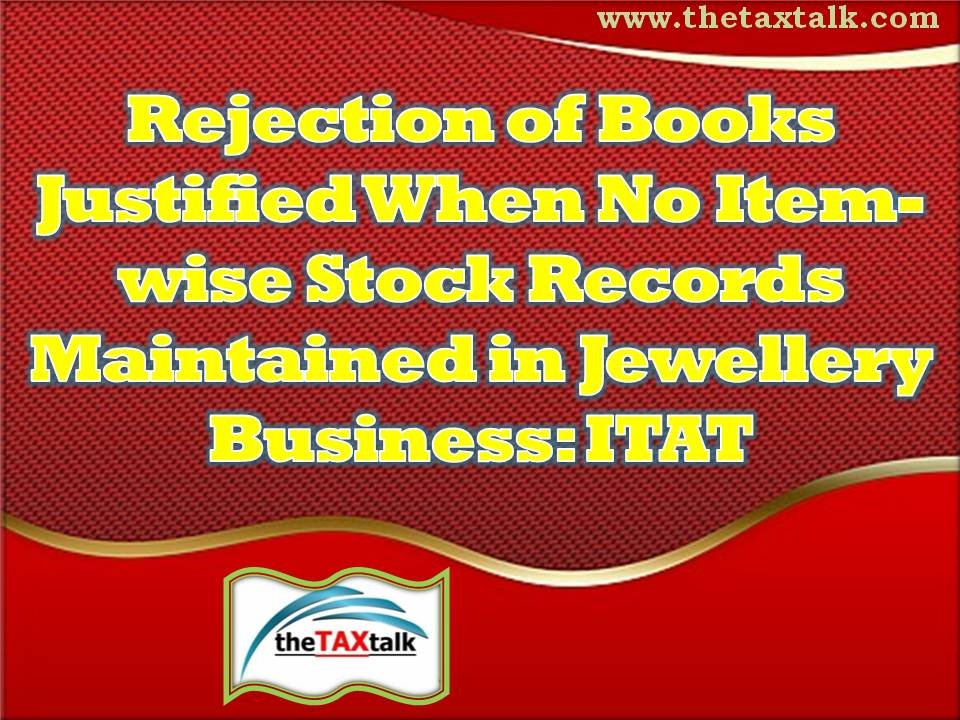![]()
Rejection of Books Justified When No Item-wise Stock Records Maintained in Jewellery Business: ITAT
In a detailed and well-reasoned decision, the Panaji Bench of the Income Tax Appellate Tribunal (ITAT), in the case of Virupakaxappa Sidramappa Bembalgi vs. ITO [2025] 173 taxmann.com 820 (dated 08-04-2025), upheld the rejection of books of account under Section 145(3) where the assessee had failed to maintain critical item-wise stock and inventory records in a jewellery trading business.
The Tribunal also strongly observed that given the complexity of the assessee’s line of business, the Assessing Officer (AO), not being an accounting expert, should have directed a special audit under Section 142(2A) rather than resorting to ad hoc income estimation.
The Business and the Issue
The assessee was engaged in wholesale and retail trading of gold, silver, and small jewellery items. For Assessment Year 2017-18, the case was picked up for scrutiny. The AO observed multiple issues, including:
• Purchase of goods from unregistered dealers (URDs), with inadequate documentation to verify their genuineness.
• Absence of item-wise and product-wise inventory records, especially for precious metals and jewellery.
• Non-production of key stock details despite requisitions.
Though the assessee’s books were audited, the AO held that books were not reliable, especially given the importance of inventory tracking in such a sensitive and high-value business.
Rejection Under Section 145(3)
The Tribunal agreed with the AO’s decision to reject the books under Section 145(3) of the Income-tax Act, which empowers the AO to disregard the books of account where:
• The accounts are not complete or not correct,
• The method of accounting is not regularly followed, or
• The accounting standards notified under Section 145(2) are not followed.
In this case, the Tribunal noted:
“Inventory and stock records form an integral part of the accounts of any trading concern, especially in the business of precious metals. Non-maintenance or non-production of such records renders the books substantially incomplete and unreliable.”
Accordingly, the rejection of accounts was held to be justified.
Special Audit Was the Proper Recourse, Not Estimation
However, the Tribunal also addressed a critical flaw in the AO’s approach: failure to order a special audit under Section 142(2A).
The jewellery business is inherently complex, involving:
• High volumes of small, varied items;
• Frequent price volatility;
• Thin margins with high-value goods;
• Dependence on tight inventory controls.
Given these facts, the Tribunal held that:
“When the business is complex and the AO is not an accounting expert, the proper course is to direct a special audit to accurately quantify the taxable income. Estimating income arbitrarily in such cases leads to uncertainty and unfairness.”
The AO’s failure to invoke Section 142(2A) and reliance on guesswork-based estimation was deemed inappropriate and arbitrary.
Key Legal Takeaways
1. Stock Records Are Non-Negotiable
Especially in businesses dealing with inventory-heavy goods like gold and jewellery, item-wise stock registers are indispensable. Their absence justifies rejection under Section 145(3).
2. URD Purchases Raise Red Flags
When purchases are made from unregistered dealers without complete documentation, the burden lies on the assesseeto establish their authenticity.
3. Section 142(2A) Is a Safeguard
In complex business cases, special audit is not just a statutory power-it’s a necessityto arrive at a fair assessment. The AO cannot substitute this safeguard with random estimations.
4. Procedural Fairness Matters
Even when the books are rejected, the method of determining income must be reasonable, informed, and backed by expert analysis, not mere assumptions.
Conclusion
The ruling in Virupakaxappa Sidramappa Bembalgi vs. ITO delivers a balanced message: taxpayers must maintain robust documentation, especially in high-value and high-risk sectors like jewellery. At the same time, tax authorities must follow due process and expert procedures like special audits when assessing complex businesses.
Failure on either side leads to flawed outcomes-either invalid assessments or unjust tax burdens.
The copy of the order is as under:


